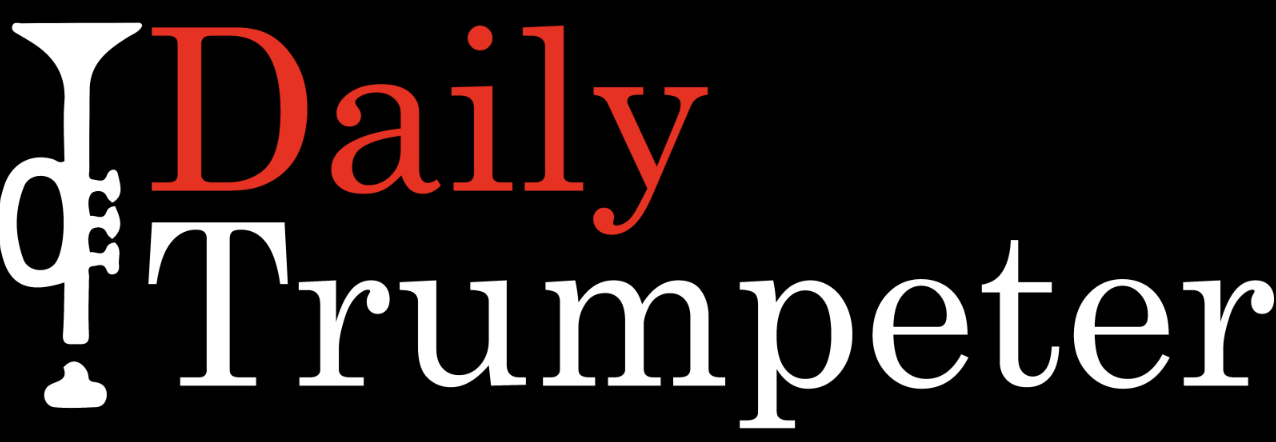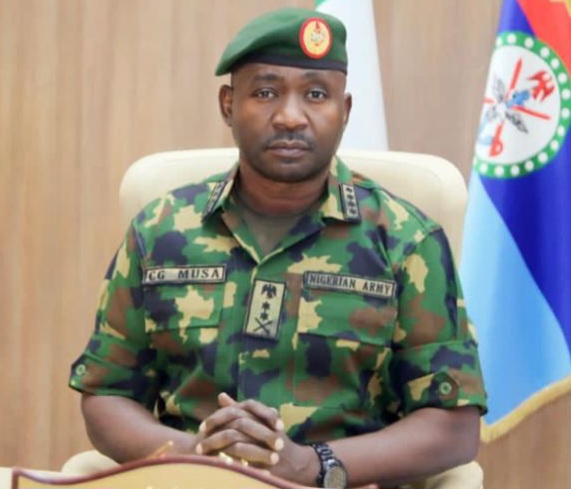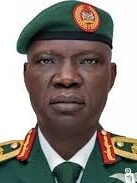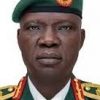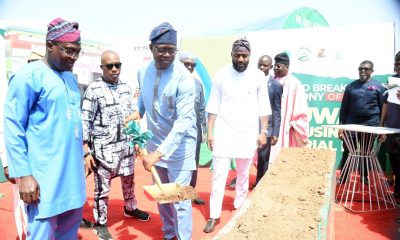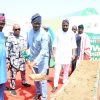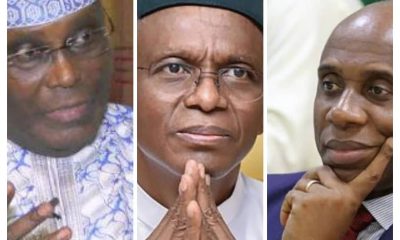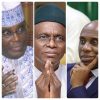Opinion
Concerning Veterans’ entitlements
By Dele Olaitan

In recent times, nothing trends among the circle of military retirees more than discussions about denied or withheld entitlements. As usual, various unreasonable and illogical reasons are being given by government officials as responsible for nonpayment. Is justice delayed not justice denied? But what can the hapless, helpless and largely disoriented veterans do? Prominent among these are the cash palliative granted by the President far back about a year ago, the pension increment in the ratio of 20% and 28% as applicable granted with effect from January this year and the new minimum wage recently approved. In recent past, the Academic Staff Union of Universities (ASUU) got embroiled in a long drawn battle with the federal government over entitlements issues. That battle is yet ongoing though as a cold war. The Nigerian Labor Congress (NLC) had cause to complain recently of being short changed by the federal government pursuant to their negotiated New Minimum Wage and fuel pump price agreements. When and where termites easily devastate and devour ceramics, what and which gods can save calabashes and wooden implements? In a situation where the organized labor groups face herculean challenges from government over wages and other entitlement issues, one can easily understand the fate and predicaments of military veterans (that a finance Minister once clearly and openly described as “unproductive”) over same.
This essay is mainly necessitated by the desire to draw attention of workers and veterans to certain facts which constitute the basic grounds and raison d’etre for this very ugly state of affairs. Until and unless these are grappled with and clearly understood, there can hardly ever be a way forward for proper resolution.
The first and most basic is that Nigeria is an abnormal, awkward and unusual nation. This perhaps might be one of the reasons why late Ahmadu Bello (first and only Premier of the now defunct Northern region) described the amalgamation of the northern and southern protectorates as “the mistake of 1914”. Even if it is not, the amalgamation was clearly a mistake that made wealth without work a national culture. This is simply why almost everything Nigerian or National hardly thrive, succeed or survive in the country. Anybody in doubt should fact check this please. “Nigeria is a fraud” as described by Chief Richard Akinjide (may his learned soul rest in eternal peace). As such, everyone inclined to fraud and sharp practices are on the ‘silk way’ to riches so long they are untouchable and can act with arrogant impunity in the country.
One very apparent example depicting Nigeria as a fraud of a nation as concerns the military is the unending gale of insecurity which has overwhelmed her. Despite the superlative performance records of our military and other security agencies outside the shores of Nigeria, internal insecurity has become insurmountable Achilles’ heels and cannot be resolved by our ‘gallant and valiant’ military. Foreign missions of our military is never a sole endeavor of Nigerians hence they most often abide by international best practices as others involved do. But back home, it is mostly an issue of “do as pleases you so long you can get away with it”. Nigeria’s environment and setting usually make nonsense of international best practices in all fronts and endeavors when the nation’s core interests are in contention. Insecurity as a national phenomenon has become a booming business for all those involved just like in other national assets and establishments. We may never see the end of it though it won’t be allowed to consume the nation due to the pecuniary interests fueling it. So, corruption won’t allow workers and veterans get what is due to them at appropriate times and in appropriate proportions. This is usually despite careful and conscious appropriations and arrangements often made in such regards.
Secondly is the background, calling and professional ethics of military service. Traditionally, the military as a state apparatus of coercion gives no room for open display of dissent and disenchantment. This is why two or more gathering of ‘denial victims’ and grumbling service personnel has very implicating legal description and interpretations. Hence protests and or strike actions are heresies and unheard of in the military. And since everybody within the system are conscious of this fact, denial of entitlements, inequity and injustice have become ‘weaponised’ to the extent that victims must think twice before they can cry out. Those ‘Pharaohs’ that suck service personnels’ blood through all forms of corrupt practices usually do not spare them even in retirement. The common canon which dishonest, disloyal and unpatriotic elements within the system subscribe to is “wait for your time”. It is easy for any doubting Thomas to check this out. Or why is it easily possible for those in the top hierarchies of the military to cart away billions of military funds without hoopla until after their exit? Those that are aware of the thieving sessions were abiding their time and turn to steal hence hardly or cannot raise any alarm. This is a form of ‘Emilokan’ syndrome as applicable to stealing and embezzlement of public funds in Nigeria.
Going forward, the heresy and or taboo that protests and strike actions are in the military symbolically impact upon veterans too. This is essentially because protests can be simply described as “rants of ants” (apologies to late Chuba Okadigbo) if there is no opportunity of strike actions to give it teeth as a last resort. So it beats common sense to expect the powers that be to listen to and respond positively to threats of and or actual protest actions of veterans when even those still in active service and other workers or civil servants are merely treated as tolerable irritants. Protests can at most embarrass the government when and if its timing is auspicious enough. If not, Nigerian governments have shamelessly proved most times to be resiliently unreliable when it comes to workers’ demands and entitlements.
Thirdly, by virtue of the professional ethics and peculiarities of military service as explained above, veterans cannot have pressure groups. All groups (except the Nigerian Legion which is understandably a government establishment to interface with veterans) in whatever name called and whichever description presently in existence are more or less class, course or rank groups established for continuous interactions among members towards more enjoyable retirement life. Were this not so, even numerous associations of old students and the likes nationwide can as well be called or described as pressure groups. It is doubtful if the Corporate Affairs Commission have legal authority to register military veteran associations (or any group of retirees for that matter) as pressure groups. Who can these associations and groups pressurize? What means and methods are available for any of them to effect pressure even if they so desired and are inclined? In other words therefore, it is not either appropriate or auspiciously practicable for retirees (military or otherwise) to form pressure groups. Such can hardly serve any useful purpose for the mere fact of being reduced to toothless bulldogs eventually.
However, individual military personnel and veterans stand far better chance and have constitutionally recognized avenues or channels and rights to pursue whatever denials and deprivations suffered. Coming together or ganging up as a group of veterans against the federal government under whatever pretext can be dangerous. Not even now where a so called democratic government is clamping down on civil protesters and allegedly prosecuting them on trumped up charges. Thus the highest these groups (of veterans) can do is to lobby and leverage on inter personal relationships to achieve mutual and collective goals using pooled resources from members.
Furthermore, existing acrimony resulting from prejudices among service personnel largely affects common approach to common issues. In most cases, the noncommissioned officers (NCOs) see their superiors as oppressors responsible for their denials and sufferings. And among the officer cadre, those in the lower rungs of the ladder see those in the top echelons as tolerable predators that must not be angered but avoided at all times possible. In fact, a basic example in this case is the establishment of ‘One Star Veterans Association’ (OSVA) dedicated to the furtherance and pursuit of their peculiar interests. Ironically, Brigadier Generals who undeniably qualify to be described as truly senior officers feel shortchanged one way or the other and are clamoring for justice and redress hence their formation of OSVA. It is doubtful if any of them would be thinking as they are now if promoted to Two Star General rank. Also, as there are different types of commissions into the officer cadre, there are prejudices alongside these differences too. It is quite understandable that these prejudices would certainly impact upon appointments, postings and promotions across the lines. All these have carry over effects into retirement with the ‘we know ourselves’ mindset. So in the Nigerian military, “anything goes” hence anything can happen. Veterans must assiduously take cognizance of these facts when agitating, demanding, fighting and or requesting for their rights and entitlements.
Another fact of certain individual veterans who are chaste and above board not being happy with the unprofessional conduct of their colleagues while in service hence have prejudices cannot be ruled out. But this class of military retirees hardly bother themselves and would rather remain resigned to fate. Unfortunately, their silence is not golden but rather very demoralizing and depressing. It must be understood that one individual effort and influence if properly coordinated and pursued, can make a heaven of difference. Those with wherewithal of interpersonal relationships must help.
Lastly, the culture of being educated without being enlightened common to Nigerians do not help issues at all. Most military service personnel hardly know their dues, entitlements, rights and responsibilities not to talk of how to demand and fight for them. For example, how many officers and men of the Nigerian military have copies of the Constitution of this nation they claim to be defending? How many of them have copies of the Terms and Conditions of Service which basically guide their professional conducts? Almost everything about finances and administration in the Nigerian military is shrouded in secrecy. It is doubtful if the Nigerian military has any channel whether online or otherwise where potential officer cadets and recruits can access information on career prospects uninhibited. Is our military a secret cult establishment? The little literature or publications available are not widely circulated. And where such are found, the very poor reading culture of Nigerians constitutes a very big setback. If knowing oneself and knowing the enemy is a basic disposition to winning hundred battles, it behooves Nigerian military personnel to acquaint themselves with facts, figures and pointers about their responsibilities, rights and entitlements. This is the basic minimum requirement for truly professional service personnel’s ability, capability and preparedness to demand and fight for same.
On the whole however, it must be noted that it is only where there is value can there be appreciation. As such, the degree of value that Nigerians place upon themselves would largely go a long way to determine how they appreciate themselves. Anything of little or no value is neither cherished nor appreciated. This is why the working class Nigerians and those at the lowest rungs of military and security services are treated as the scum of the society hence denied dues and entitlements willfully. They are most often remembered only at very critical times when their services is dire and urgent. Otherwise, they are often forgotten as inconsequential beings soonest the annual ceremonies of Workers’ Day and Armed Forces and Remembrance Day is over. If not so, must workers and military service personnel and veterans agitate and protest or go on strike before their very legitimate dues and entitlements are given to them? Nigeria is perhaps one particular nation where this ugly development is pronounced. And this is only so and shall continue to be so as long as Nigeria is seen largely as a business conglomerate whose board of directors treat shareholders as mere pawns not to talk of workers who they see as tools that can be replaced at will.
In conclusion, workers in the Nigerian public service and military service personnel including veterans must devise new strategies and evolve new tactics that would make them to become cherished shareholder and stakeholder citizens which the powers that be cannot afford to joke with or take for granted. In this information technology and communication era, face off between oppressors and the oppressed need not be cantankerous or violent. There are many ways to kill a rat, what matters most is its death. Let’s remember that ‘heavens help those that help themselves’. Hence if the government through its officials decide to ‘Daboh’ workers and veterans, there should not be any hesitation to ‘Tarka’ the government back promptly for we all are Nigerians. Since impression is master to perception, we must not forget that “it takes a slave to accept slavery”. Let technology take the lead at all times and be proactively utilized for full positive effects. After all, the Yoruba say “Ogbon ju agbara lo” which literally means sense belittles strength. Above all, we must always remember that equity is best sought with clean hands. A word is enough for the wise.
Major Dele Olaitan (rtd) lives in Ilorin
